
 |
Track World Cup Round 2 - CDMDunc Gray Velodrome, Sydney, Australia, May 10 - 12, 2002 |
|
French leave Sydney World Cup track, sans gold
- New Zealand and USA emerge with new stars
By Gerard Knapp
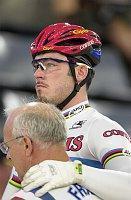 |
THE superpower of track cycling, France, left Sydney's Dunc Gray Velodrome last night without any gold medals after three days of competition in round two of the UCI's Track World Cup.
While the French team were without several of their big guns, they did bring their biggest star, Arnaud Tournant, who could only manage a silver in the sprint final.
The other big superpower of track cycling, Germany, also finished without a gold medal. Germany did not enter the teams pursuit event - where they hold the world record - but they did have their top Madison duo of Stefan Steinweg and Eric Weispfenning in attendance. However, the 2000 World Madison champions could only manage a fourth place in the 40km Madison.
While it was expected that Australia would (and did) collect a swag of medals, being on home turf and not having to cope with the long-distance travel, the results from New Zealand and the USA gave their respective team managers great confidence in the lead-up to the Commonwealth Games in Manchester.
The final medals tally showed Australia in first place with five gold and four silver, and the Kiwis in second with four gold, three silver and two bronze. The USA finished third with three gold and three silver. An ominous warning for the French came from the British power-riders, such as Chris Hoy, who nearly set a PB to win the 1Km time trial. The Brits also won the team sprint ahead of France.
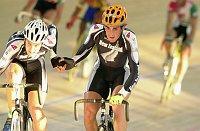 |
Another big name competing in Sydney was naturalised Belgian Matthew Gilmore, the world's leading six-day rider, who also went home empty-handed. Gilmore was clearly not at his peak and rode the Madison with his 19 year-old partner, Iljio Keisse, to lend experience, more than aiming for a medal.
But Gilmore and other endurance riders would have left Dunc Gray impressed with the effort of the Kiwi duo, Greg Henderson and Hayden Roulston, who put on what was probably the ride of the event in the 40km Madison.
The New Zealanders went on the attack with 90 laps remaining in the 160 lap event; the duo stayed on the attack for the remainder of the race as they were challenged by riders from up to six countries at some stages, who were doing their best to avoid being caught by the Kiwis.
With only 12 laps remaining, the Kiwis reeled in the former world champion duo from Germany who tried their hardest to stay in contention. To many observers, it was one of the hardest ways to win a Madison, but they made it look easy. Indeed, after the race, Roulston told Cyclingnews "It felt like we could have kept going for another 80 laps of that today".
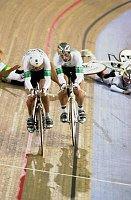 |
Overall, the New Zealanders excelled in the endurance events, with NZ national coach Max Vertongen praising the strategic input of Charlie Walsh, former head track cycling coach for Australia. "We're using a lot of his stuff," Vertongen said of the programs which Walsh has developed for his riders. "We're tapping into his knowledge built up over 20 years," he said of Walsh's tenure as the publicly-funded Australian cycling coach. Endurance cycling was Walsh's specialty and in Sydney at least, his new client certainly put the wood on Australia.
The Gold to New Zealand in the final of the teams pursuit came as a result of Australia crashing while nearly two seconds in front of the Kiwis and with five laps to go. However in qualifying New Zealand had finished strongly to post the best qualifying time. It was the second time in consecutive years an Australian pursuit team has crashed in international competition; last time it happened was at the Worlds in Antwerpen.
The other star of the Kiwi squad apart from the Madison duo was Sarah Ulmer, winning gold in the women's individual pursuit and the scratch race. In the latter, Ulmer also put on an impressive solo display to basically destroy the race for all but two other competitors who managed to hold her wheel when she attacked early into the event.
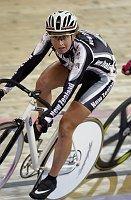 |
One of those break-away companions was Sarah Hammer, an 18 year-old from the USA who showed great maturity and class to follow the right wheel, and then work over Cathy Moncassin of France to secure the silver in the scratch race. These two riders basically gave up trying to catch Ulmer, who put in another huge attack (after driving the break which lapped the field) some five laps from the end. Ulmer crossed the line over half a lap ahead of the other two riders, while Hammer and Moncassin played cat-and-mouse for the silver. Hammer was clearly the faster of the two, winning comfortably.
It wasn't a great weekend for reigning world champions - another rainbow jersey-wearing rider, Mexico's Nancy Liarely Contreras, could only manage a bronze in the women's 500m time trial. Incidentally, the 500m TT was won by the USA's Tanya Lindenmuth, who was in sparkling form, also taking silver in the women's sprint against Tammy Thomas (USA), probably the most intimidating-looking female rider on the boards since the retirement of former world champion Lucy Tyler-Sharman.
Thomas's gold brought the USA's haul to three golds - all won by women - while Jame Carney showed his class to win silver in the men's scratch race, won by Holland's Robert Slippens.
Sarah Hammer added a gold medal to her haul (which included a silver from the scratch race) by using endurance and a superior sprint to out-tally Moncassin (silver) and New Zealand's Sarah Ulmer (bronze) in the points race.
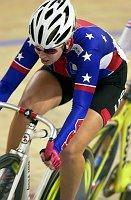 |
Not surprisingly, USA's national track coach Des Dickie was very happy with Thomas and Hammer. He told Cyclingnews' Karen Forman "We only brought a small team of five riders - four women and one man - but we have done very well," he said. "It is a young team - all the senior riders left after the Olympics, so at this stage we just want to be competitive. I think the women's program is very strong, while the men's is still developing."
Another winner from the worlds at Antwerpen last year, Australia's keirin world champion Ryan Bayley, also found himself watching the final of the keirin from the infield, rather than from behind the derny. Nevertheless, the Australians were expected to dominate, which they did, although one name that was missing from the medals was Rochelle Gilmore. Meanwhile, Sean Eadie was the star sprinter of the round, winning golds in the keirin and sprint, Mark Renshaw won the points race and Rosealee Hubbard continued her excellent form by taking the women's keirin by leading out from the front. Peter Dawson won the men's individual pursuit and also set a PB in qualifying.
Other nations who performed well included Great Britain, with five medals (two gold, two silver and one bronze) and the Netherlands with two medals (one gold and one bronze).
France won two silver and three bronze, South Africa one silver and one bronze, Malaysia one silver, and Greece, Canada, Germany, Colombia and Mexico one bronze apiece. Belgium, Hungary and Poland finished out of medals entirely.
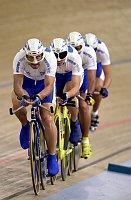 |
Special mention should go to the team from Greece, who won two bronze medals in the team sprint (defeating Australia) and perhaps surprisingly, the team pursuit. The heavy builds of the Greek riders defied their endurance abilities, but they came from behind to overhaul Poland on the very last lap in the ride-off for bronze. It has to be reported that Poland dropped its fourth rider at half-race distance, but at that stage they had a comfortable lead over the Greek quartet and looked like they were going to cruise home.
But the Greeks gradually lifted their tempo and as they watched their deficit stabilise, the Poles began to crack. The Greek coach urged on his big-hitters (who really do look like sprinters) and Ioannis Tsakouridis, Vasilos Gianniosis, Elpidoforos Potouridis and Kostas Rodopoulos reduced their deficit to only 0.2 seconds with two laps to go, and then with one lap to go it was only 0.036 of a second as they closed in on the Poles. As both teams approached their respective finish lines, it was impossible to tell until the clock showed the Greeks had won it by 0.169 seconds. Your correspondent had not seen a closer battle for bronze since Peter Keen guided Yvonne McGregor to the bronze in the 2000 Olympics women's IP.
Coach John Papanidis said "We are very happy with our trip here and our two third places. The time for the team pursuit bronze medal was a national record for Greece." (See interview.)
The emergence of Greece in track cycling - as part of its buildup for the Athens 2004 Olympics - also helps the UCI's globalisation plans for track cycling and the World Cup in particular.
UCI vice president Ray Godkin said he was happy with the Sydney round, which is the second of the five World Cup fixtures for 2002. "It was a very, very exciting series," he said, "very successful indeed. "We saw some remarkable performances. Next year, there will be double the number of cyclists and the event will be bigger and better, we assure you. "
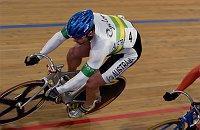 |
Sydney followed the first round of the Track World Cup, held last month at Monterrey in Mexico. The next stop for the WC riders will Moscow, before heading back to South America (Cali, Colombia, to be precise), then to Kunming, China, for the fifith and final round. Then it's over to Denamrk for the World Championships in Copenhagen from September 25 - 29.
It would seem that the track riders are making up for their relative lack of road miles by criss-crossing the globe in search of covered velodromes - one of the rules for a country to host a round of the Track World Cup, which effectively eliminates the USA from contention.
The UCI is serious about building the profile of the Track World Cup and to assist with this aim, and has introduced tough new rules for entry to the World Championships.
Next year, all countries who wish to enter the World Championships will have to enter teams in each round of the World Cup, which means there will be a minimum of 32 teams competing in next year's rounds, the locations of which are still being negotiated.